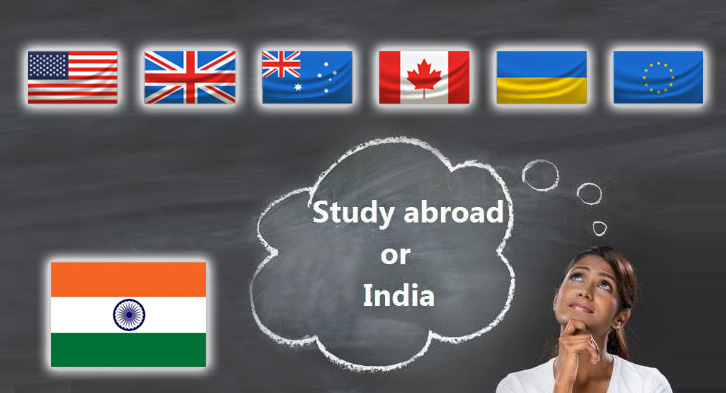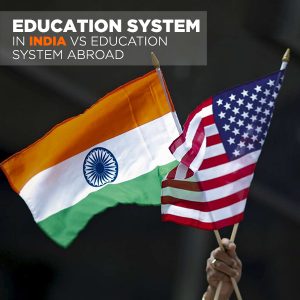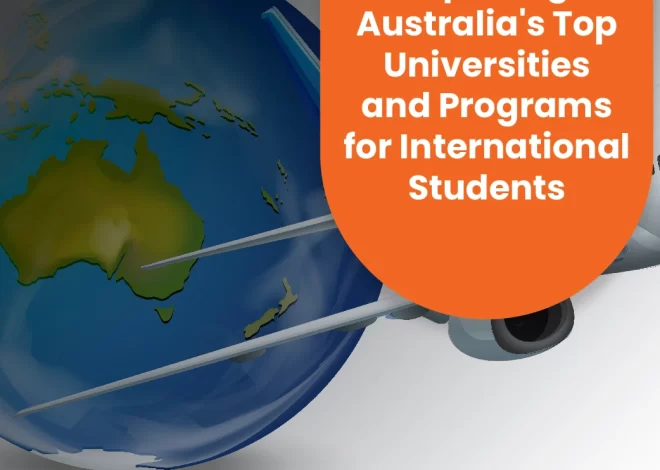Education System in India vs Education System Abroad

Education System in India and Education System Abroad
An Overview
Comparing education systems in India and abroad, the admission process differs significantly. Foreign universities prioritize holistic profiles, standardized tests, and non-academic aspects, fostering creativity and practical learning, contrasting India’s traditional exam-centric approach. Choose wisely for a personalized learning journey.
Teaching Methods
| Teaching method is theoretical. | Teaching method is more practical and application-oriented. |
| It is more teacher-driven | It is more student driven. |
| Classroom teaching forms a large part of student engagement. | Non-classroom teaching forms a good part of student engagement. |
Student Learning
| Students are encouraged to assimilate information. | Students are encouraged to explore and participate outside classroom sessions to learn information in varied ways. |
| Learning is meant to enhance one’s knowledge base. | Learning meant to enrich one’s experience. |
Academic Autonomy
| Indian universities have limited academic autonomy. | Foreign universities have a lot of academic autonomy (wrt research, courses, offering subjects , etc.). |
| They need to meet requirements laid down by the state or central education bodies. | universities can easily launch novel subjects or to respond to industry needs or current trends |
Subject or Elective Choice
| Students can select only from a limited number of subjects , as allowed for the stream . | Students can select only from across many subjects, and other streams as well. |
Flexibility TO Change
| Switching subjects or major electives , after a course commences, is not possible . | -Switching subjects or major electives can be done easily. -Such changes are possible even during the middle of the course (as per university procedure). |
Research and Learning
| Research in Indian universities is quit low. It has improved a bit recently | -Foreign education systems have a robust research environment -with projects and resources available across most streams and fields of study. |
| But more works needs to be done on funding and research infrastructure in many Indian universities. | -students have any research projects to choose from . -most Foreign universities have many resources of grants of funding for their research activities. |
Cost of Education
| It is relatively less expensive to study in India. | It is more expensive to study in abroad. |
| The tuition fees an expensive in some of the colleges and courses. | The incidental costs like accommodation ,food and travel can be quite a lot. |
| Accommodation and other living expenses are lower than the abroad. | Unless students get scholarships , the fee could be a huge cost burden. |
Scholarships
| The availability of scholarships is lower than in universities abroad. | -scholarships have been around for a very long time .There are many options for scholarships available |
| Awareness and availability of scholarships have started increasing a bit in recent years. | -Based on economic status. -Based on academic score and performance. -Based on certain subjects or courses selected. |
Performances and Assessment
| Exams and marks form a major chunk of student assessment . | Projects , research , non-classroom participation , and sports performance carries a lot of weightage for assessments. |
| Relative grading is catching up in many institutes (to replace absolute marking). | Relative grading for exams has always been more popular (than absolute marks). |
Selection Basis
| Many admissions are merit based (through admissions tests). | Admissions are purely merit based |
| Admissions based on specific quota (like economic strata) are possible . -Other criteria (such as referrals for candidates, or government schemes ) admissions is possible | -students pursing professional sports are given preference . |
Job Opportunities
| Top universities are provide good job opportunities. | International degrees promise very good job opportunities at home and abroad. |
| Lesser ranked colleges may find it difficult to provide placements or other opportunities. to students. | After graduating students not interested in jobs can find other opportunities like joining research assistantship , or in-house college openings . |
Once you identify which education meets your unique personality and choice, you need to know about their different admission processes.
Admission Process in India and Abroad/Foreign
In India, admissions rely on competitive exams and merit lists, varying by university. Abroad, the process is holistic, evaluating academics, extracurriculars, personal statements, and recommendations. Standardized tests like SAT or GRE are common. India prioritizes cutoffs and rankings, while overseas, diversity is key. Navigating these differences is vital for students transitioning from the Indian to international education system.
You need to prepare differently for an Indian and a foreign university admission.
Process for Abroad/Foreign Universities
1. Check your eligibility for the chosen programme. non-academic programme
2. Fill out and send the course application form.
3. You also need to send your profile
This is an all-round picture of the student with a description of their academic and non-academic programme extracurricular work. This is really important and is crucial for gaining admission.
4. Keep a good recommendation letter handy
5. You need to take the test recommended by the university (TOEFL/ IELTS/ ACT/ SAT/ MCAT/ LSAT/ GMAT/ GRE). * Institute-specific tests are conducted for some courses only (like medicine).
6. Keep all prescribed documents verified and ready.
7. Get ready with sources for fee payment and to also meet living costs.
8. Check the requirements and your child’s eligibility for the relevant student visa.
Process for Indian Universities
1. Check your eligibility for the chosen programme.
2. Fill out and send the course application form.
(Few contemporary Indian universities require you to send the student’s non-academic profile as well.)
3. Take the required institute-specific or common entrance test.
4. Get the counselling for stream and campus choice done (done for many common entrance tests).
5. Keep all prescribed documents verified and ready.
6. Prepare for fee payment within the cut-off date.
What You Can Expect from Foreign Education
1. Courses are offered in diverse formats to cater to all types of students.
2. A high standard of writing skills and articulate presentation will be a big takeaway for your child.
3. Universities abroad emphasise a well-rounded personality.
4. Critical thinking is highly encouraged in foreign education.
5. Your child will get exposure to a diverse and multicultural mix of students – and hence become a truly global citizen.
The Changing Indian Education System
The Indian education system uses standard styles of teaching. The scope of a personal learning experience is low. But many contemporary Indian universities are now trying to implement many best practices of foreign education systems – like non-traditional pedagogy, campus & study resources, grading performance, and new-age subjects.
Your College Profile
Now that you have known all about the education systems, it’s time for the most important step – preparing a college-ready profile for you. Foreign education systems necessarily require the student’s profile while applying for any programm.
A good profile should talk about your practical experience and non-academic skills, along with your academic background. It should bring out the all-round personality.
Know how to make an outstanding college profile.
So, are you now ready to choose the study destination?
Education System in India vs Education System Abroad
Education is one of the many basic needs of survival in today’s world. The value, interpretation and mode of education varies from place to place. One can say that education is an ever evolving concept which is in turn for the betterment of the human kind.
Although the way in which it is delivered is certainly different but the aim of instilling values along with creativity remains common worldwide. More so, education is an all-round process that escalates skills, inculcates good values and beliefs and knowledge in a person so that personality of the person is developed.
While we all are aware that every education system has its own pro and con; there are some of the major factors that make Study in Abroad system more approachable as compared to that of the Indian education system.
Theoretical approach or Practical approach
Both of these approaches are important. Although having a practical oriented study approach makes us more market ready as compared to that of theoretical approach. Indian education system is purely theory centric while foreign system is entirely practical centric. Not only that, practical oriented study approach makes the process easy, interactive and interesting while theoretical approach makes the learning process less interactive and at times monotonous.
Creativity or Marks
Each of us is very well aware of the fact that scoring good marks is extremely vital to get into a good school/college. This not only restricts a student from exploring his/her horizons but also blocks their creative side. In contrast, foreign education system allows and encourages a student to think out of the box and manifests their creative side.
Degree or Knowledge
To become eligible for most of the job openings in India, one has to have a degree regardless of the level of knowledge you have. Unlike India, foreign country’s education is taken as learning process and students learn the concepts while they study and apply those in their work culture.
A Tested route or a field of your liking

It is as though is the set rule that if a student has a good score he/she has to opt for science related subjects whereas if a student fails scoring well he/she must ether opt for commerce or arts related subjects. However, foreign education system encourages a student to go for a subject based on his/her liking.
These were some of the over-rated differences between studying in India vs studying in a foreign country. While India is moving towards digitization, it is also coming up with various latest courses. Also, there are many other factors that proves the superiority of foreign education system.
FAQs Education System in India vs Education System Abroad
- What is the main difference between the education system in India and the education system abroad?
The main difference between the education system in India and the education system abroad is the theoretical approach vs. practical approach. Indian education is primarily theory-based, whereas foreign education systems are predominantly practical-based.
- Why is practical-oriented study approach important?
Practical-oriented study approach makes the learning process easy, interactive, and interesting. It helps to make students market-ready, and they learn to apply the concepts they have learned in real-life situations.
- How does the foreign education system encourage creativity?
The foreign education system encourages students to think outside the box and manifest their creative side. Unlike India, foreign countries put less emphasis on marks and more on the learning process, which allows students to explore their horizons and choose a subject based on their liking.
- Why is having a degree important in India?
To become eligible for most job openings in India, one has to have a degree, regardless of the level of knowledge they have. The Indian job market places more importance on degrees rather than practical knowledge.
- What is the tested route in the Indian education system?
In the Indian education system, it is a set rule that if a student has a good score, they have to opt for science-related subjects. Conversely, if a student fails to score well, they must choose either commerce or arts-related subjects.
- What other factors prove the superiority of foreign education systems?
Apart from the theoretical vs. practical approach, the foreign education system encourages self-learning, creativity, critical thinking, and adaptability. It also exposes students to multicultural environments, which helps broaden their perspective and enhances their problem-solving abilities.
Student Testimonial
There are not enough words in the language that can describe how much Imperial helped me in my journey. For that I’m forever indebted and grateful. I’d like to thank everyone at imperial especially Ms. Saloni Patel. She is a really good mentor and even better person. If you guys need any sort of help be it counseling up until reaching your destination. I’d recommend Imperial Overseas Education without a doubt.
Parth Parkar
All you need for your study-abroad adventure.
Connect with Expert Counselors Today!



